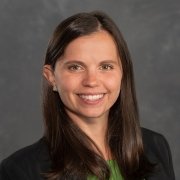Holding Space for Grief
August 2025 MedEdPearls: The role of actively creating space for grief.

“The pressure to behave as though everything is fine feels untenable yet inescapable.” Does this feel familiar? Shannon O’Sullivan details her experience with the sudden death of her mother including this powerful statement. This event impacted the immediate semester and her feelings on grief, supporting students, and work-life balance in academia. It can be incredibly difficult for professionals with schedules that never stop to navigate a significant change such as this. Whether the source of our sadness comes from the loss of a loved one, a changing research landscape, the dismantling of a beloved program, or moving from one position to another, feelings of grief arise.
These feelings may be easy to discern, such as sadness or anger, or could be more ambiguous. Ambiguous grief results from a loss that is both unclear yet real, physically absent yet psychologically present or vice versa. Examples of this could include having your duties change within your role and thus losing the community of people you worked with daily. They are still there, but your reason to engage with them is not. Another example could be a promotion or the attainment of a Chair position – the increase in duties may necessitate a reduction in time devoted to working with and mentoring students. Here, the change is an objective positive, but the loss of time with students is a loss. These experiences can spark feelings that are as complex and unique as the people involved; yet in academic medicine, those feelings may be secondary to continuing to do the work.
But what happens when we ignore grief? Recent articles detail the increased stress that can come when grief is ignored, inhibited, or minimized. It is a completely normal human experience for grief to accompany change, even positive change, as the relationships, daily activities, and routines that once made up our everyday are no longer there. How do we, as medical educators and faculty developers, support our fellow faculty during times of such grief?
Holding space for mourning is key, and this space is hard to come by in an environment like academic medicine that prioritizes productivity and progress. As faculty developers, we can find ways to infuse this space into our community by providing opportunities for faculty to connect and discuss change or simply to connect without an agenda. This infusion can look like dedicated networking events or even a moment of acknowledgement of what people may be going through at the beginning of a workshop. We can advocate for institutional awareness of the emotions associated with change and for large-scale discussion or listening sessions when a big change is enacted. This could be as simple as talking about the benefits of flexible work arrangements with your leaders or employing restorative justice practices to engage in deep conversations with groups of faculty. These conversations can harness educator commitment to student success and provide space to process grief within the hope of a shared goal.
As you are planning your faculty development offerings for the coming academic year try to find opportunities to incorporate space. This could include time to reflect on change, to identify underlying emotions, or to connect with the faculty community. As we continue in a world where change is inevitable, we will do well to foster a culture where not being ok is ok.
MedEdPearls are developed monthly by the health professions educator developers on educational affairs. Previous MedEdPearls explored compassion, creating joy at work, and flourishing.
About the MedEd Pearls Author
The MedEdPearls are a collaborative, peer-reviewed, monthly brief intended to provide practical tips and strategies for medical and health professions educators to enhance teaching and learning.

Stacey Wahl
PhD
- Assistant Professor; Senior Instructional Designer, VCU School of Medicine
- Jean Bailey, PhD – Virginia Commonwealth University School of Medicine
- Carrie Bowler, EdD, MS, MLSCM (ASCP) – Mayo Clinic School of Continuous Professional Development
- Kristina Dzara, PhD, MMSc (Educators ’16; Assessment ’16; HCE 2.0 ’17) – Saint Louis University School of Medicine
- Shanu Gupta, MD, SFHM – University of South Florida Morsani College of Medicine and Tampa General Hospital
- Jennifer Hillyer, PhD – Northeast Ohio Medical University
- Larry Hurtubise, PhD, MA (HCE 2.0 '16) – The Ohio State University
- Anna Lama, EdD, MA – West Virginia University School of Medicine
- Machelle Linsenmeyer, EdD, NAOME (Assessment ’07) – West Virginia School of Osteopathic Medicine
- Skye McKennon, PharmD, BCPS, ACSM-GEI – Washington State University Elson S. Floyd College of Medicine
- Rachel Moquin, EdD, MA – Washington University School of Medicine
- Stacey Pylman, PhD – Michigan State University College of Human Medicine
- Leah Sheridan, PhD – Northeast Ohio Medical University
- Lonika Sood, MBBS, MHPE – Washington State University Elson S. Floyd College of Medicine
- Mark Terrell, EdD – Lake Erie College of Osteopathic Medicine
- Stacey Wahl, PhD – Virginia Commonwealth University School of Medicine
Harvard Macy Institute
Harvard Macy Institute
The Harvard Macy Institute educates, connects, and serves health care leaders around the globe by providing advanced faculty development programs, thought leadership, and impactful networking opportunities.
6 Programs

